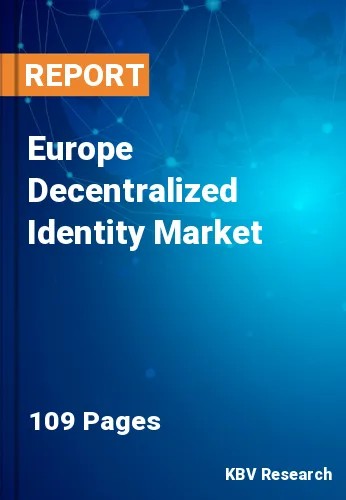The Europe Decentralized Identity Market would witness market growth of 77.8% CAGR during the forecast period (2022-2028).
By their very nature, blockchain-based transactions are visible and transparent; however access and visibility could be restricted. Land registries, realtors overseeing property listings, insurance firms, banks, and a variety of other businesses can all be linked to decentralized identities. Decentralized identities allow constructing an edge solution with transparent, verifiable procedures in a trustless environment on a personal, company, or government level without losing privacy or the security of critical information. Several real estate processes are still performed on paper, which can be costly and lead to more manual errors.
In a system where customers consent to exchanging credentials, requesting only the essential credentials for individuals to establish their identities creates a new level of confidence and transparency between organizations and individuals. With developers, decentralized identity removes the requirement for passwords and complex authentication methods, allowing for higher app design standards.
Governments across this region understand the importance of adopting latest technologies and protecting users from any kind of data breaches. The ability to develop trust, particularly online, has become increasingly vital in this digital age. The foundation of future economies would be having an agreed-upon digital identity that can be used easily and universally. A trust framework is a set of agreed-upon rules and standards that organizations must adhere to. If a company is a member of the digital identity trust framework, customers can rest assured that they adhere to agreed-upon standards to secure personal data and privacy.
The UK digital identity and attributes trust framework lays out standards so that businesses may understand what constitutes "excellent" identity verification. Every business in the trust framework can ensure that they operate in a similar, trustworthy manner by adhering to these rules and criteria. This means that if visitors create a digital identity in the future, they may be able to use it in a variety of situations, for example, if users created a digital identity to open a bank account safely, they may be able to use it to find a new job faster or rent a home without forced to share all of their personal identity data with the landlord or estate agent.
The Germany market dominated the Europe Decentralized Identity Market by Country in 2021, and would continue to be a dominant market till 2028; thereby, achieving a market value of $580.4 million by 2028. The UK market is experiencing a CAGR of 76.3% during (2022 - 2028). Additionally, The France market would exhibit a CAGR of 79.1% during (2022 - 2028).
Based on Identity Type, the market is segmented into Non- biometrics and Biometrics. Based on Vertical, the market is segmented into BFSI, Telecom & IT, Real Estate, Retail & Ecommerce, Government & Public Sector, Healthcare & Life Sciences, Media & Entertainment, Transport & Logistics, Travel & Hospitality, and Others. Based on Organization size, the market is segmented into Large Enterprises and SMEs. Based on End user, the market is segmented into Enterprises and Individual. Based on countries, the market is segmented into Germany, UK, France, Russia, Spain, Italy, and Rest of Europe.
Free Valuable Insights: The Global Decentralized Identity Market will Hit $8.9 Billion by 2028, at a CAGR of 78.5%
The market research report covers the analysis of key stake holders of the market. Key companies profiled in the report include Accenture PLC, Microsoft Corporation, Ping Identity Holding Corp. (Vista Equity Partners), Avast Software s.r.o., Wipro Limited, Persistent Systems Limited, Civic Technologies, Inc., Nuggets Ltd., R3 LLC, and Validated ID, SL.
By Identity Type
By Vertical
By Organization size
By End user
By Country
Our team of dedicated experts can provide you with attractive expansion opportunities for your business.

